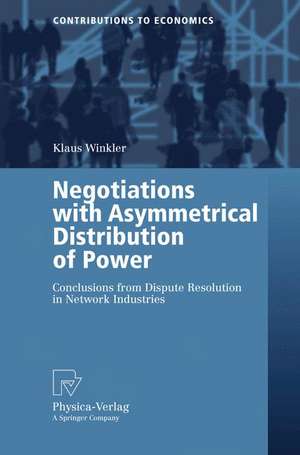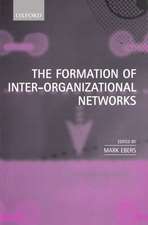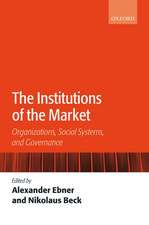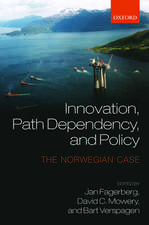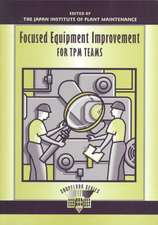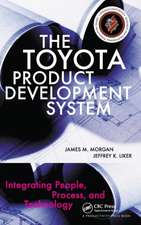Negotiations with Asymmetrical Distribution of Power: Conclusions from Dispute Resolution in Network Industries: Contributions to Economics
Autor Klaus Winkleren Limba Engleză Paperback – 14 aug 2006
Din seria Contributions to Economics
- 18%
 Preț: 1001.81 lei
Preț: 1001.81 lei -
 Preț: 90.83 lei
Preț: 90.83 lei - 15%
 Preț: 649.06 lei
Preț: 649.06 lei - 18%
 Preț: 1109.92 lei
Preț: 1109.92 lei - 24%
 Preț: 657.09 lei
Preț: 657.09 lei - 18%
 Preț: 976.54 lei
Preț: 976.54 lei - 17%
 Preț: 361.03 lei
Preț: 361.03 lei - 18%
 Preț: 1027.83 lei
Preț: 1027.83 lei -
 Preț: 283.93 lei
Preț: 283.93 lei - 15%
 Preț: 644.95 lei
Preț: 644.95 lei - 15%
 Preț: 638.24 lei
Preț: 638.24 lei -
 Preț: 394.29 lei
Preț: 394.29 lei - 15%
 Preț: 636.80 lei
Preț: 636.80 lei - 15%
 Preț: 637.78 lei
Preț: 637.78 lei - 18%
 Preț: 723.69 lei
Preț: 723.69 lei - 15%
 Preț: 635.47 lei
Preț: 635.47 lei - 15%
 Preț: 634.00 lei
Preț: 634.00 lei -
 Preț: 392.75 lei
Preț: 392.75 lei -
 Preț: 383.33 lei
Preț: 383.33 lei - 15%
 Preț: 637.28 lei
Preț: 637.28 lei - 15%
 Preț: 636.80 lei
Preț: 636.80 lei - 18%
 Preț: 950.96 lei
Preț: 950.96 lei - 15%
 Preț: 634.68 lei
Preț: 634.68 lei -
 Preț: 387.38 lei
Preț: 387.38 lei - 15%
 Preț: 647.27 lei
Preț: 647.27 lei - 15%
 Preț: 636.63 lei
Preț: 636.63 lei - 15%
 Preț: 639.73 lei
Preț: 639.73 lei -
 Preț: 385.62 lei
Preț: 385.62 lei - 15%
 Preț: 641.85 lei
Preț: 641.85 lei - 20%
 Preț: 649.60 lei
Preț: 649.60 lei - 15%
 Preț: 641.71 lei
Preț: 641.71 lei -
 Preț: 387.96 lei
Preț: 387.96 lei - 15%
 Preț: 645.47 lei
Preț: 645.47 lei -
 Preț: 385.08 lei
Preț: 385.08 lei - 15%
 Preț: 646.62 lei
Preț: 646.62 lei -
 Preț: 383.33 lei
Preț: 383.33 lei - 15%
 Preț: 638.43 lei
Preț: 638.43 lei -
 Preț: 381.21 lei
Preț: 381.21 lei - 15%
 Preț: 642.51 lei
Preț: 642.51 lei - 15%
 Preț: 637.78 lei
Preț: 637.78 lei - 15%
 Preț: 641.71 lei
Preț: 641.71 lei -
 Preț: 384.70 lei
Preț: 384.70 lei -
 Preț: 379.86 lei
Preț: 379.86 lei -
 Preț: 378.34 lei
Preț: 378.34 lei -
 Preț: 384.70 lei
Preț: 384.70 lei -
 Preț: 388.52 lei
Preț: 388.52 lei - 15%
 Preț: 641.71 lei
Preț: 641.71 lei -
 Preț: 381.00 lei
Preț: 381.00 lei - 15%
 Preț: 644.95 lei
Preț: 644.95 lei -
 Preț: 386.00 lei
Preț: 386.00 lei
Preț: 636.80 lei
Preț vechi: 749.19 lei
-15% Nou
Puncte Express: 955
Preț estimativ în valută:
121.87€ • 126.76$ • 100.61£
121.87€ • 126.76$ • 100.61£
Carte tipărită la comandă
Livrare economică 14-28 aprilie
Preluare comenzi: 021 569.72.76
Specificații
ISBN-13: 9783790817430
ISBN-10: 3790817430
Pagini: 208
Ilustrații: VIII, 198 p. 7 illus.
Dimensiuni: 155 x 235 x 14 mm
Greutate: 0.32 kg
Ediția:2006
Editura: Physica-Verlag HD
Colecția Physica
Seria Contributions to Economics
Locul publicării:Heidelberg, Germany
ISBN-10: 3790817430
Pagini: 208
Ilustrații: VIII, 198 p. 7 illus.
Dimensiuni: 155 x 235 x 14 mm
Greutate: 0.32 kg
Ediția:2006
Editura: Physica-Verlag HD
Colecția Physica
Seria Contributions to Economics
Locul publicării:Heidelberg, Germany
Public țintă
Professional/practitionerCuprins
Asymmetrical distribution of power makes negotiations difficult.- Theory of negotiations and power display common characteristics.- Negotiations in network markets.- Alternative Dispute Resolution enables efficient negotiations.
Textul de pe ultima copertă
In many ways, complex negotiations shape the business arena of regulated network markets. In general, negotiating partners are not equal with regard to their various sources and instruments of power. This book unfolds a differentiated and, at the same time, applicable framework for analyzing and managing negotiations. It creatively combines power and negotiations theories. In addition, it illustrates the findings in a very inspiring way by investigating negotiation episodes in network industries such as telecommunications and railways. Thus, this book is highly relevant for all those wanting to better understand the complex political processes and outcomes in regulated industries, but also for those bearing practical responsibility in regulatory and government affairs and wanting to improve their management performance.
Prof. Dr. Dres. h.c. Arnold Picot, Ludwig-Maximilians-Universität, Munich, Germany
In regulated sectors negotiations and other alternative dispute resolution mechanisms should play a more important role in the future. This book makes an important contribution to that development.
Dr. Peter Knauth, Federal Minstry of Economics, Germany
Anyone seriously engaged in complex negotiations will benefit from this book.
Prof. Dr. Ingo Vogelsang, Boston University, USA
Prof. Dr. Dres. h.c. Arnold Picot, Ludwig-Maximilians-Universität, Munich, Germany
In regulated sectors negotiations and other alternative dispute resolution mechanisms should play a more important role in the future. This book makes an important contribution to that development.
Dr. Peter Knauth, Federal Minstry of Economics, Germany
Anyone seriously engaged in complex negotiations will benefit from this book.
Prof. Dr. Ingo Vogelsang, Boston University, USA
